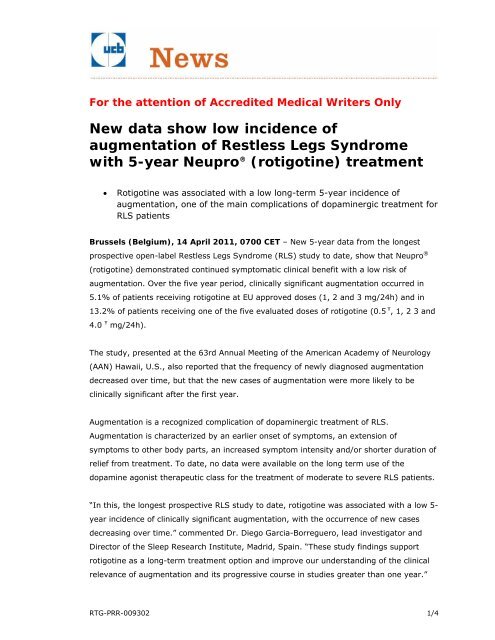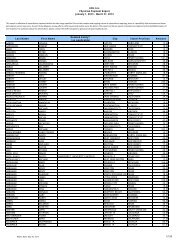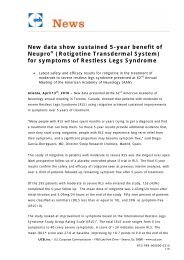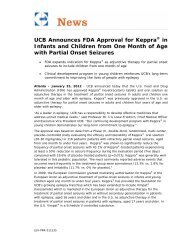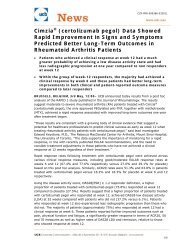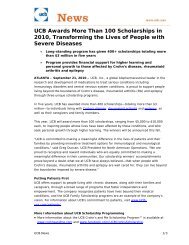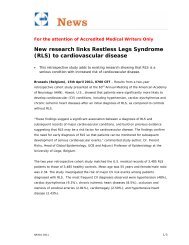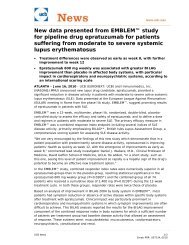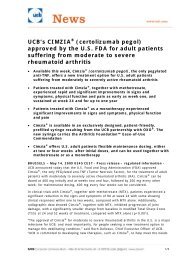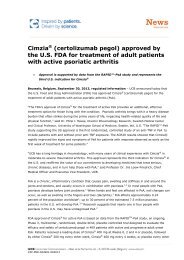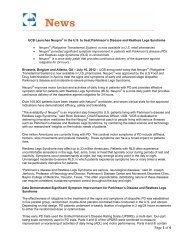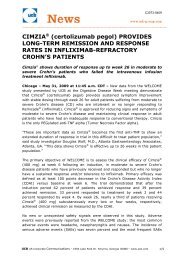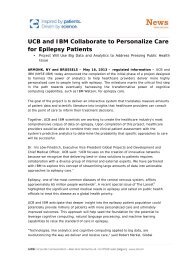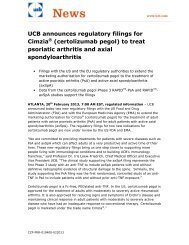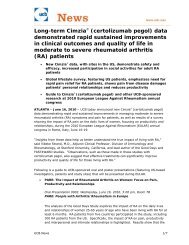New data show low incidence of augmentation of Restless ... - UCB
New data show low incidence of augmentation of Restless ... - UCB
New data show low incidence of augmentation of Restless ... - UCB
Create successful ePaper yourself
Turn your PDF publications into a flip-book with our unique Google optimized e-Paper software.
For the attention <strong>of</strong> Accredited Medical Writers Only<br />
<strong>New</strong> <strong>data</strong> <strong>show</strong> <strong>low</strong> <strong>incidence</strong> <strong>of</strong><br />
<strong>augmentation</strong> <strong>of</strong> <strong>Restless</strong> Legs Syndrome<br />
with 5-year Neupro ® (rotigotine) treatment<br />
<br />
Rotigotine was associated with a <strong>low</strong> long-term 5-year <strong>incidence</strong> <strong>of</strong><br />
<strong>augmentation</strong>, one <strong>of</strong> the main complications <strong>of</strong> dopaminergic treatment for<br />
RLS patients<br />
Brussels (Belgium), 14 April 2011, 0700 CET – <strong>New</strong> 5-year <strong>data</strong> from the longest<br />
prospective open-label <strong>Restless</strong> Legs Syndrome (RLS) study to date, <strong>show</strong> that Neupro ®<br />
(rotigotine) demonstrated continued symptomatic clinical benefit with a <strong>low</strong> risk <strong>of</strong><br />
<strong>augmentation</strong>. Over the five year period, clinically significant <strong>augmentation</strong> occurred in<br />
5.1% <strong>of</strong> patients receiving rotigotine at EU approved doses (1, 2 and 3 mg/24h) and in<br />
13.2% <strong>of</strong> patients receiving one <strong>of</strong> the five evaluated doses <strong>of</strong> rotigotine (0.5 Ŧ , 1, 2 3 and<br />
4.0 Ŧ mg/24h).<br />
The study, presented at the 63rd Annual Meeting <strong>of</strong> the American Academy <strong>of</strong> Neurology<br />
(AAN) Hawaii, U.S., also reported that the frequency <strong>of</strong> newly diagnosed <strong>augmentation</strong><br />
decreased over time, but that the new cases <strong>of</strong> <strong>augmentation</strong> were more likely to be<br />
clinically significant after the first year.<br />
Augmentation is a recognized complication <strong>of</strong> dopaminergic treatment <strong>of</strong> RLS.<br />
Augmentation is characterized by an earlier onset <strong>of</strong> symptoms, an extension <strong>of</strong><br />
symptoms to other body parts, an increased symptom intensity and/or shorter duration <strong>of</strong><br />
relief from treatment. To date, no <strong>data</strong> were available on the long term use <strong>of</strong> the<br />
dopamine agonist therapeutic class for the treatment <strong>of</strong> moderate to severe RLS patients.<br />
“In this, the longest prospective RLS study to date, rotigotine was associated with a <strong>low</strong> 5-<br />
year <strong>incidence</strong> <strong>of</strong> clinically significant <strong>augmentation</strong>, with the occurrence <strong>of</strong> new cases<br />
decreasing over time.” commented Dr. Diego Garcia-Borreguero, lead investigator and<br />
Director <strong>of</strong> the Sleep Research Institute, Madrid, Spain. “These study findings support<br />
rotigotine as a long-term treatment option and improve our understanding <strong>of</strong> the clinical<br />
relevance <strong>of</strong> <strong>augmentation</strong> and its progressive course in studies greater than one year.”<br />
RTG-PRR-009302 1/4
This study was a 5-year, prospective, open-label fol<strong>low</strong> up <strong>of</strong> a placebo-controlled Phase II<br />
trial with rotigotine. Patients were titrated to an optimal dose <strong>of</strong> rotigotine<br />
(0.5-4.0 Ŧ mg/24h) and periodically evaluated for safety and efficacy. Of the 295 patients<br />
in the study, 126 completed the 5-year fol<strong>low</strong>-up.<br />
Rotigotine <strong>show</strong>ed an improvement in the International <strong>Restless</strong> Legs Syndrome Study<br />
Group Rating Scale (IRLS) score from 27.8±5.9 at baseline to 9.0±9.2 after 5 years.<br />
Computer screening identified 145 patients out <strong>of</strong> 295 (49.2%) with potential<br />
<strong>augmentation</strong> and this was confirmed in 69 patients (24.3%), according to the Max Planck<br />
Institute (MPI) diagnostic criteria for <strong>augmentation</strong>. An international panel confirmed that<br />
39 patients (13.2%) had clinically significant <strong>augmentation</strong>. Of all patients with clinically<br />
significant <strong>augmentation</strong>, 61.5% were on the highest, unapproved dose <strong>of</strong> rotigotine (4<br />
mg/24h Ŧ ) and 61.5% experienced their first episode after one year. Frequency <strong>of</strong> newly<br />
diagnosed <strong>augmentation</strong> decreased over time, and new episodes were more frequently<br />
clinically significant. Study discontinuation due to <strong>augmentation</strong> occurred in 12 cases<br />
(4.1%).<br />
Ŧ<br />
Neupro ® (rotigotine) 0.5 mg/24h and 4mg/24h dose are not approved doses in the<br />
European Union for the symptomatic treatment <strong>of</strong> moderate to severe idiopathic <strong>Restless</strong><br />
Legs Syndrome in adults.<br />
Notes to Editors<br />
About <strong>Restless</strong> Legs Syndrome<br />
<strong>Restless</strong> Legs Syndrome (RLS) is a neurological disorder characterized by unpleasant sensations in<br />
the legs and an uncontrollable urge to move when at rest in order to relieve these feelings. It effects<br />
between 3 and 10% <strong>of</strong> the population to some extent. Most people with RLS have difficulty falling<br />
asleep and staying asleep. Left untreated the condition causes exhaustion and daytime fatigue.<br />
Many people with RLS report that their job, personal relations and activities <strong>of</strong> daily living are<br />
strongly affected as a result <strong>of</strong> their exhaustion. They are <strong>of</strong>ten unable to concentrate, have<br />
impaired memory, or fail to accomplish daily tasks. More than 80% <strong>of</strong> people with RLS also<br />
experience a more common condition known as periodic limb movement disorder (PLMD).<br />
About Neupro ® in Europe<br />
Neupro ® is approved in the European Union for the symptomatic treatment <strong>of</strong> moderate to severe<br />
idiopathic restless legs syndrome in adults. Neupro ® (rotigotine) is also approved in the European<br />
Union for the treatment <strong>of</strong> the signs and symptoms <strong>of</strong> early-stage idiopathic Parkinson’s disease, as<br />
monotherapy (i.e. without levodopa) or in combination with levodopa, i.e. over the course <strong>of</strong> the<br />
disease, through to late stages when the effect <strong>of</strong> levodopa wears <strong>of</strong>f or becomes inconsistent and<br />
fluctuations <strong>of</strong> the therapeutic effect occurs.<br />
RTG-PRR-009302 2/4
Neupro ® in Europe Important Safety Information<br />
Neupro ® is contraindicated in case <strong>of</strong> hypersensitivity to the active substance or to any <strong>of</strong> its<br />
excipients, and in case <strong>of</strong> magnetic resonance imaging (MRI) or cardioversion. Neupro ® should be<br />
removed if the patient has to undergo MRI or cardioversion.<br />
It is recommended to monitor blood pressure, especially at the beginning <strong>of</strong> treatment, due to the<br />
general risk <strong>of</strong> orthostatic hypotension associated with dopaminergic therapy.<br />
Neupro ® has been associated with somnolence episodes <strong>of</strong> sudden sleep onset episodes. Patients<br />
treated with dopamine agonists including Neupro ® , have been reported as exhibiting signs <strong>of</strong><br />
pathological gambling, increased libido and hypersexuality.<br />
Symptoms suggestive <strong>of</strong> neuroleptic malignant syndrome have been reported with abrupt<br />
withdrawal <strong>of</strong> dopaminergic therapy. Therefore it is recommended to taper treatment.<br />
Neupro ® contains sodium metabisulphite, a sulphite that may cause allergic-type reactions including<br />
anaphylactic symptoms and life threatening or less severe asthmatic episodes in certain susceptible<br />
people.<br />
Hallucinations have been reported, and patients should be informed that hallucinations can occur.<br />
Cases <strong>of</strong> cardiopulmonary fibrotic complications have been reported in some patients treated with<br />
ergot-derived dopaminergic agents. Neuroleptics given as antiemetic should not be given to patients<br />
taking dopamine agonists. Ophthalmologic monitoring is recommended at regular intervals or if<br />
vision abnormalities occur.<br />
External heat, from any source should not be applied to the area <strong>of</strong> the patch. Exposure <strong>of</strong> a skin<br />
rash or irritation to direct sunlight could lead to changes in the skin color. If a generalized skin<br />
reaction (e.g. allergic rash) associated with the use <strong>of</strong> Neupro ® is observed, Neupro ® should be<br />
discontinued.<br />
Caution is advised when treating patients with severe hepatic impairment or acute worsening <strong>of</strong><br />
renal function, a dose reduction might be needed.<br />
The <strong>incidence</strong> <strong>of</strong> some dopaminergic adverse events, such as hallucinations, dyskinesia, and<br />
peripheral oedema generally is higher when given in combination with L-dopa. This should be<br />
considered when prescribing Neupro ® .<br />
Neupro ® should not be used during pregnancy. Breast-feeding should be discontinued.<br />
Augmentation may occur in <strong>Restless</strong> Legs Syndrome patients. Augmentation refers to the earlier<br />
onset <strong>of</strong> symptoms in the evening (or early afternoon), increase in severity <strong>of</strong> symptoms, and<br />
spread <strong>of</strong> symptoms to involve other body parts.<br />
Adverse drug reactions reported in more than 10% <strong>of</strong> Parkinson’s patients treated with Neupro ® are<br />
nausea, vomiting, application site reactions, somnolence, dizziness and headache.<br />
Adverse drug reactions reported in more than 10% <strong>of</strong> RLS patients treated with Neupro ® are<br />
nausea, application site reactions, asthenic conditions and headache.<br />
All Neupro ® supply should be stored in a refrigerator. There is no need for patients to transport<br />
Neupro ® patches in special containers and they must not be stored in a freezer compartment.<br />
Please refer to the European Summary <strong>of</strong> Product Characteristics for full prescribing information<br />
Neupro ® European Summary <strong>of</strong> Product Characteristics (Approved February 2011)<br />
http://ec.europa.eu/health/documents/community-register/html/alfregister.htm<br />
RTG-PRR-009302 3/4
About Neupro ® in the U.S.<br />
Neupro ® (Rotigotine Transdermal System) is indicated in the U.S. for the treatment <strong>of</strong> the signs and<br />
symptoms <strong>of</strong> early-stage idiopathic Parkinson’s disease.<br />
In April 2008, <strong>UCB</strong> recalled Neupro ® from the U.S. market after ongoing monitoring revealed that<br />
specific batches <strong>of</strong> Neupro ® had deviated from their approved specification. Neupro ® is currently not<br />
available in the U.S. <strong>UCB</strong> is working with the U.S. FDA so that Neupro ® can be available to patients<br />
with early-stage Parkinson’s disease as soon as possible.<br />
For further information<br />
Nancy Nackaerts, External Communications, <strong>UCB</strong><br />
T +32.473.864.414, nancy.nackaerts@ucb.com<br />
Eimear O'Brien, Associate Director, Global CNS Communications <strong>UCB</strong><br />
T +32.2.559.9271, eimear.obrien@ucb.com<br />
Onsite at Congress<br />
Andrea Levin, Senior Manager, Communications & PR, U.S.<br />
T +770.970.8352, andrea.levin@ucb.com<br />
About <strong>UCB</strong><br />
<strong>UCB</strong>, Brussels, Belgium (www.ucb.com) is a global biopharmaceutical company focused on the<br />
discovery and development <strong>of</strong> innovative medicines and solutions to transform the lives <strong>of</strong> people<br />
living with severe diseases <strong>of</strong> the immune system or <strong>of</strong> the central nervous system. With more than<br />
8 500 people in about 40 countries, the company generated revenue <strong>of</strong> EUR 3.2 billion in 2010. <strong>UCB</strong><br />
is listed on Euronext Brussels (symbol: <strong>UCB</strong>).<br />
Forward looking statement<br />
This press release contains forward-looking statements based on current plans, estimates and<br />
beliefs <strong>of</strong> management. Such statements are subject to risks and uncertainties that may cause<br />
actual results to be materially different from those that may be implied by such forward-looking<br />
statements contained in this press release. Important factors that could result in such differences<br />
include: changes in general economic, business and competitive conditions, effects <strong>of</strong> future judicial<br />
decisions, changes in regulation, exchange rate fluctuations and hiring and retention <strong>of</strong> its<br />
employees.<br />
RTG-PRR-009302 4/4


